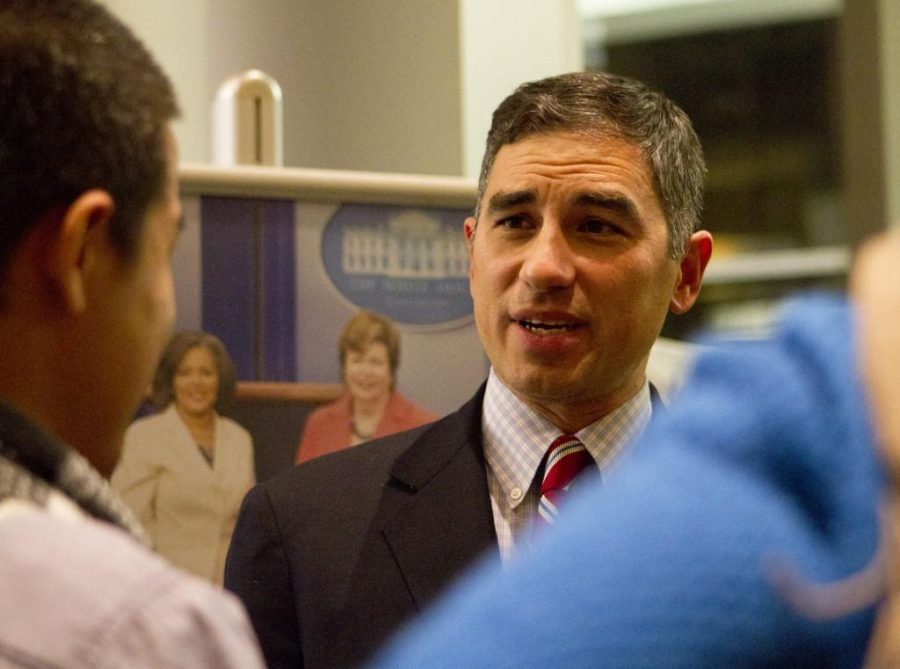Former Medill Prof. Alec Klein to release book after resignation, allegations of ‘predatory’ behavior
Daily file photo by Meghan White
Former Medill Prof. Alec Klein at an event in 2012. Klein is releasing a book next January titled “Aftermath: When It Felt Like Life Was Over But It Wasn’t.”
September 8, 2019
Alec Klein, the former director of the Medill Justice Project who resigned last year amidst allegations of sexual misconduct, will release a book about the “hope and ultimate redemption” he found after his life was “razed” by a “‘guilty until proven innocent’ culture.”
In February 2018, 10 former students and employees sent an open letter to administrators, accusing Klein of “controlling, discriminatory, emotionally and verbally abusive behavior.” Over the next month, 19 more women came forward with similar allegations. And after a University probe into his behavior ended last June, Klein resigned last August.
His book, titled “Aftermath: When It Felt Like Life Was Over But It Wasn’t,” will be published by Fidelis Books and set to be released in January. Klein has denied the allegations outlined in the letter, pointing to his positive CTEC reviews, and continues to do so in the 208-page book.
“When a well-respected professor at a top university is falsely accused of being abusive to students, how will he pick up the pieces and rebuild his life?” the book description says.
Fidelis Books and Klein did not immediately respond to requests for comment. In March 2018, however, Klein’s lawyer described the allegations as “wholesale butchery of the life of Prof. Alec Klein.”
After alumna Natalie Escobar (Medill ‘18) shared the news on Twitter, other alumni and members of the media expressed their opinions.
Escobar wrote that “men don’t get cancelled, they get book deals.” Others pointed out grammar and spelling errors in the description.
“I am obviously aghast at this for many reasons but since when was aneurysm spelled ‘aneurism’” Morgan Kinney (Medill ‘16) wrote.
Klein joined Medill’s faculty in 2008 after working as an investigative reporter for the Washington Post and teaching journalism at Georgetown and American University. After former director David Protess resigned in 2011, Klein took over the investigative project at Northwestern.
Klein told The Daily in 2011 that he wanted to restore trust in the class and project, calling the Medill Justice Project a “crown jewel for Northwestern.”
But the 2018 letter described an environment devoid of trust. Among other allegations, the signees accused Klein of attempting to kiss a prospective employee, making sexually graphic remarks at work, pressing for explicit details about others’ sex lives and making unwanted physical contact.
“We have seen many men of great talent —even some of our journalism heroes — fail,” the authors of the 2018 letter wrote. “But know this: Alec Klein is no hero. And journalism, especially the emerging journalists who come to Medill to learn in a safe space, will be better served without him.”
University spokesman Bob Rowley said the University is “committed to fostering an environment in which all members of our community are safe, secure and free from sexual misconduct of any form” in an email statement.
“Northwestern is aware of the pending book release by Alec Klein. The University investigated the allegations against him thoroughly, following established procedures designed to ensure fairness to all parties,” Rowley said. “The decisions of some Northwestern students to come forward with their complaints undoubtedly were not easy ones, and we commend them for having had the courage to do so.”
This story was updated at 6:10 p.m. on Sept. 9 with comment from University spokesman Bob Rowley.
Email: [email protected]
Twitter: @pamesjollard


